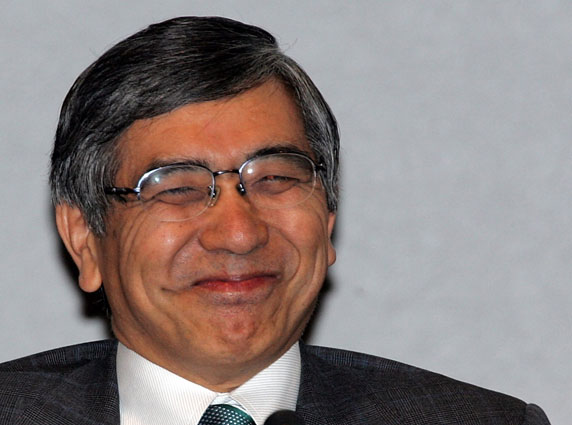Personal Wealth Management / Economics
Youkoso, Kuroda-san?
Word has leaked Japanese Prime Minister plans to nominate Asian Development Bank chief Haruhiko Kuroda to steer the Bank of Japan. What can we expect from the likely new chief?
Likely new Bank of Japan chief Haruhiko Kuroda may find he has less to smile about if his quantitative easing measures prove as ineffective as the last several years of asset purchases. Photo by Junko Kimura/Getty Images.
Japan’s monetary policy returned to the spotlight Monday, after word leaked new Prime Minister Shinzo Abe plans to nominate Asian Development Bank chief Haruhiko Kuroda to succeed Masaaki Shirakawa as Governor of the Bank of Japan (BoJ). The nomination’s expected to go to Parliament by week’s end and should clear the Liberal Democratic Party (LDP)-controlled lower house relatively easily, but a heated battle in the upper house, where the Democratic Party of Japan (DPJ) retains a majority, seems likely.
In his search for a new BoJ chief, Abe had one main goal: Finding someone to execute his campaign pledge of “unlimited monetary easing.” Kuroda, a longtime critic of BoJ policy, seems to fit the bill. He’s often said Japan needs more aggressive and extraordinary easing to end 15 years of deflation, which he says the BoJ’s ultimately responsible for. This stance likely curries plenty of favor with the stimulus-enamored LDP, but the DPJ favors a more measured monetary approach and may not be keen to confirm him. Then again, Abe’s threatened to amend the BoJ’s charter, if necessary, to force his campaign pledges through—if he repeats the threat during the debate, the DPJ may accept Kuroda to safeguard the bank’s independence.
Assuming the pick goes through, what Kuroda’s monetary policy would look like isn’t clear. He’s spoken favorably of more Japanese bond purchases and was cagy on foreign debt purchases in a recent Wall Street Journal interview, but he’s not shy about his belief the yen is overvalued—and he oversaw a few rounds of intervention to stem the yen’s appreciation during his turn as Vice Finance Minister from 1999 to 2003. Yet Japanese monetary policy is already pretty darned loose. Japan’s already about two-thirds of the way through its current ¥101 trillion ($1.1 trillion) Comprehensive Monetary Easing Program (quantitative easing, or QE), and once that wraps in January 2014, open-ended monthly asset purchases of about ¥13 trillion ($140 billion) per month will begin.
But as in the US and UK, most of that money’s parked at the BoJ as excess bank reserves. The same thing happened during Japan’s first quantitative easing program, which ran from 2001 to 2006—Japan’s deflation is more tied to money velocity than money supply. Economic reform could probably help reverse this. If Parliament passed measures to address Japan’s many structural issues (e.g., narrow labor markets, weak demographics, waning productivity and trade protectionism, to name a few), firms would likely be more keen to invest and banks more eager to lend. Absent such structural changes, it’s difficult to envision further asset purchases meaningfully boosting growth—no matter how aggressive.
These structural changes don’t seem high on Abe’s agenda—if they’re there at all. For example, plans to sell part of the government’s stake in Japan Tobacco to help finance ongoing earthquake recovery were big news Monday, but this mini-privatization is an incremental move. Following the sale, the government’s stake will go from 50% to 33.3%, where it’s legally bound to remain. A similar law requires the government to own one-third of Nippon Telegraph and Telephone, and if the Japan Post privatization ever moves forward, the government will also be required to keep a 33.3% stake. In fact, of Japan’s more than ¥22 trillion in partially state-owned enterprises, about ¥20 trillion is legally restricted from sale.
In addition to tying up federal capital, the state’s involvement interferes with normal market behavior. For instance, the law requiring partial public ownership of Japan Tobacco also requires the government to purchase all tobacco harvested by domestic farmers. And Japan Post’s role as a backdoor government financing mechanism has been well-documented over the years. Full privatization of these and other companies (holdings include energy firm Inpex and some subsidiaries of the Japan Railways Group) would allow markets to function more efficiently, but it’s politically unpopular. Former Prime Minister Junichiro Koizumi needed four years and all of his political capital to pass the legislation to privatize Japan Post (much of which has been dismantled in the years since). Since then, Japan’s prime ministers have largely eschewed similar moves—the revolving door makes them unable to do much and, likely, wary of even trying. Abe, whose first term lasted barely one year, likely feels this threat acutely. Hence why he’s so focused on stimulus—which enjoys massive popularity—rather than deep public sector reform.
This, in a nutshell, is why Japan’s near-annual political turnover is such a headwind for the country—leaders simply don’t have the clout or inclination to usher in much-needed changes. So they opt for monetary easing and the occasional fiscal stimulus package, and Japan’s long-running funk continues. We’re rather skeptical this changes any time soon, despite Abe and Kuroda’s bold claims.
If you would like to contact the editors responsible for this article, please message MarketMinder directly.
*The content contained in this article represents only the opinions and viewpoints of the Fisher Investments editorial staff.
Get a weekly roundup of our market insights
Sign up for our weekly e-mail newsletter.

You Imagine Your Future. We Help You Get There.
Are you ready to start your journey to a better financial future?

Where Might the Market Go Next?
Confidently tackle the market’s ups and downs with independent research and analysis that tells you where we think stocks are headed—and why.






